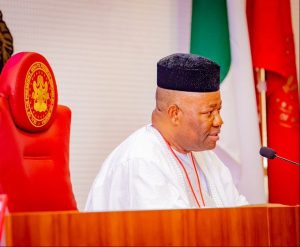
The 650,000 barrels per day Dangote Refinery may not be able to deliver Premium Motor Spirit (PMS) also called petrol to the domestic market in May as widely reported earlier.
LEADERSHIP learnt that the delay may not be unconnected with the installation of residue fluid catalytic cracking unit (RFCCU) to facilitate sustainable refining of petrol by the refinery.
An industry expert told our correspondent that the RFCCU is an advanced version of the Fluid Catalytic Cracking Unit (FCCU).
“This is causing delays in efforts by the refinery to commence petrol refining,” another source within the firm said.
LEADERSHIP efforts to get confirmation from spokesman of the Dangote Group, Tony Chiejine, were unsuccessful as he didn’t pick his calls nor respond to WhatsApp messages sent to him before this report.
The Fluid Catalytic Cracking Unit is a piece of refining equipment used to convert the heavy portion of crude oil feedstock into oil lighter petroleum products, including liquified petroleum gas and gasoline.
The FCCU uses a chemical process known as cracking to break down large hydrocarbon molecules into smaller molecules by exposing them to a catalyst and extreme heat. Common catalysts include zeolite, bauxite, silica-alumina, and aluminum hydrosilicate. Once the FCCU process is complete, the product is then sent to a hydrocracker for further processing.
LEADERSHIP recalls that the Dangote Refinery was reported to be set to supply petrol to marketers by May 2024.
The refinery has already begun the distribution of diesel and aviation jet fuel to domestic marketers, a development that has reduced the retail price of both products.
Bloomberg had reported the new mega-refinery would begin supply of PMS to the domestic market in May, significantly reducing Nigeria’s dependence on imported petroleum products.
The refinery, which began its operations in January, made its first export last month, shipping 65,000 metric tonnes of low-sulfur straight run fuel oil and approximately 60,000 tonnes of naphtha.
The facility is operating at an initial processing rate of 350,000 barrels per day, with plans to increase towards its maximum capacity.
However, analysts at the Standard and Poor’s’ Global Commodities Insights have projected that the Dangote Refinery will start supply of petrol in the fourth quarter of this year rather than the next month being stated by the company.
This was disclosed by Kelly Norways- an African energy expert at the S&P podcast titled: “Exploring West Africa’s oil product flows in a changing refining landscape” where its analysts shared insights on the latest trends in the energy market across Europe and West Africa.
She commented on the impact of the Dangote refinery to significantly reduce energy imports across the West African sub-region putting the figure for petrol as 290,000 barrels daily from 2024 and 2026.
In her words, “We are starting to see signs of activities, but all eyes are on when we’ll start to see gasoline production commence from that project. There is a significant amount of pressure from the Nigerian government for a significant volume of that supply to be sent to the domestic market.”
“In reality, when we see that start scale up is still subject to debate. Dangote has recently been espousing some punchy timelines. They have most recently been saying that they are looking to produce gasoline by May. But in reality, our analyst expects that it would be something like the fourth quarter of this year in a more realistic timeline.”
Furthermore, the discussion delved into the changing dynamics of petroleum product flow into West Africa in the past few months with reduced supply of petroleum products into Africa following reduction from hitherto traditional suppliers the Netherlands.
It noted that the decline in supply from The Netherlands Amsterdam and Rotterdam refineries was due to improvements in quality and new regulations from those places since 2022.
The Dangote refinery was officially commissioned in May 2023 but has not been able to operate at full capacity due to a series of delays. However, it began receiving crude oil around December and finally started distribution of diesel to marketers in the local market in March.
LEADERSHIP






